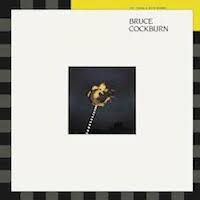Music journalism, books and more
Liner Notes: Bruce Cockburn - The Trouble with Normal
 People have made a great deal of fuss about Bruce Cockburn’s activism, usually citing his song “If I Had a Rocket Launcher” as evidence of a sudden shift toward radical politics. He wrote the controversial in 1983 after making his first trip to Central America, where he visited a refugee camp that was attacked by U.S.-backed military helicopters. But, as Cockburn fans know, it wasn’t the first time the respected Canadian singer-songwriter had vented anger at imperialist intervention. He’d tackled the topic as far back as the mid-1970s, with his “Yankee gunboat” song “Burn.” In fact, Cockburn’s political views had evolved steadily, as a direct extension of his spirituality. “Can’t be an innocent bystander,” he declared on his 1981 album, Inner City Front, “in a world of pain and fire and steel.”
People have made a great deal of fuss about Bruce Cockburn’s activism, usually citing his song “If I Had a Rocket Launcher” as evidence of a sudden shift toward radical politics. He wrote the controversial in 1983 after making his first trip to Central America, where he visited a refugee camp that was attacked by U.S.-backed military helicopters. But, as Cockburn fans know, it wasn’t the first time the respected Canadian singer-songwriter had vented anger at imperialist intervention. He’d tackled the topic as far back as the mid-1970s, with his “Yankee gunboat” song “Burn.” In fact, Cockburn’s political views had evolved steadily, as a direct extension of his spirituality. “Can’t be an innocent bystander,” he declared on his 1981 album, Inner City Front, “in a world of pain and fire and steel.”
Completed immediately prior to that fateful Central American trip, The Trouble with Normal bristles with much of the same anger and outrage. Cockburn had been given a book of poetry written by Sandinista priest Ernesto Cardenal and read it while on holiday in the Canary Islands. Those revolutionary poems inspired Cockburn to write
“Tropic Moon,” a taut piece of punk that takes direct aim at the U.S.-financed war in Nicaragua. Another lunar-themed song written in the Canaries, the laid-back, Spanish-tinged “Waiting for the Moon,” shares a similar tension about the uncertainty of a possible invasion. “Might be a party—might be a war,” Cockburn sings, “when those faceless sailors come ashore.” And disturbing military imagery crops up in the chorus of “Planet of the Clowns,” the third song written in the Canaries: “The waves roar on the beach like a squadron of F16s.”
Perhaps the heaviest song on the album is the title track. Citing labour strikes, tenant struggles and Third World subjugation, Cockburn laments “the grinding devolution of the democratic dream.” After observing that “suddenly it’s repression, moratorium on rights,” he asks, “what did they think the politics of panic would invite?” Essentially, it’s a rejection of the status quo and a call to action. “The trouble with normal,” warns the chorus, “is it always gets worse.” When Cockburn performed the song in the summer of 2002, he introduced it this way: “This is an old song that seemed timely when I wrote it and unfortunately it still does.”
While explicit politics dominate The Trouble with Normal, some songs simply reflect urban realities. Set to a reggae beat, “Going Up Against Chaos” is a tale of lovers who brave the discrepancies of city life. Over Hugh Marsh’s searing violin and Jon Goldsmith’s deliberately discordant piano, Cockburn sings about “a dream on the horizon and a punch-up on the street.” And in the syncopated “Civilization and Its Discontents,” whose title was borrowed from a book by Sigmund Freud, Cockburn admits to suffering from some of the same alienation that he sees around him. “Even though I know who loves me,” he sings, “I’m not that much less lost.”
“Candy Man’s Gone” is about having faith in the wrong dreams, while “Put Our Hearts Together” is another reggae number that raises the spectre of a Ku Klux Klan Grand Dragon and Ireland’s reactionary Reverend Ian Paisley before calling for racial unity. But the album’s most striking track may be “Hoop Dancer,” Cockburn’s first song of spoken verse. Written in Tokyo, it begins with a series of rapid, visionary images of street scenes and prairie settings before morphing into a jazzy, hypnotic suite for violin and guitar. “It’s about time perceived as a continuum in which we’re all connected in some arcane way,” Cockburn once explained, “both to one another and to past races of man.”
This remastered version of the album also contains two bonus tracks. The romantic “Wanna Dance With You” is yet another reggae number that Cockburn originally recorded but then left on the shelf. Some of the words were recycled in two later songs: “Lovers in a Dangerous Time” and “When You Give It Away.” Now, the full lyrics are available in the song for which they were originally conceived. And “Cala Luna” is a moody instrumental written on the Italian island of Sardegna whose entrancing effects linger long after the song is over. Like Inner City Front and its predecessor, Humans, The Trouble with Normal is a rich testament to Bruce Cockburn’s increasingly sophisticated sound—and worldview.
Nicholas Jennings
Originally released 1983, reissued 2002 by Rounder Records.

